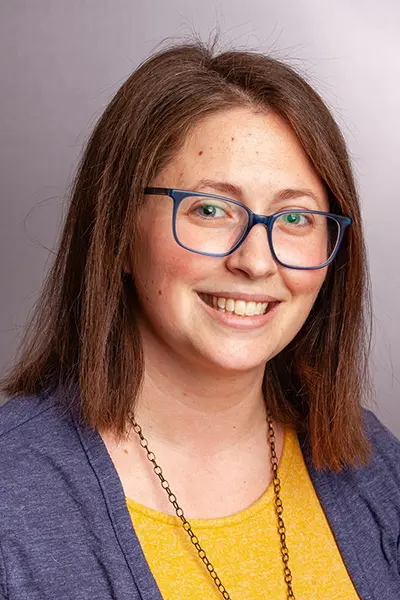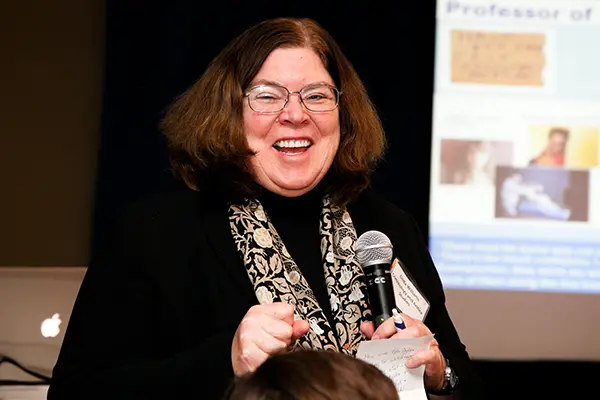Caregiver Support Leads to Best Outcomes, Says Psychology Assoc. Prof. Stephanie Block
 Image by Norman Jaillet Photography
Image by Norman Jaillet Photography
06/23/2022
By Katharine Webster
About one-quarter of child sexual abuse reports involving adult suspects result in criminal charges, according to a study by UMass Lowell professors in psychology and criminology.
More than half end during the investigation stage, while 23% are not pursued after intake, says Psychology Assoc. Prof. Stephanie Block, the principal investigator on a $498,333 grant from the National Institute of Justice for research on 500 cases of child sexual abuse, including 325 involving adult suspects (generally age 16 or older in the jurisdictions where the research was conducted).
When cases are prosecuted against adult suspects, 57% of them result in a guilty verdict or plea, says Block, who worked with Criminology Prof. Emerita Linda Williams, psychology Ph.D. graduates Hannah Johnson ’22 and Kristy Shockley ’20, and other graduate and undergraduate students.
In some cases, other ways of dealing with sexual abuse might be better for the child victims. But when cases do move forward to prosecution, they face other barriers, the researchers say, including jurors who may have mistaken beliefs about what evidence in child sexual abuse cases looks like, Block says.
“People don’t want to believe these things are actually happening until they’re faced with it head-on, especially when the suspect is a respected or trusted adult. And no one wants to believe how common child sexual abuse is, in all socioeconomic groups,” she says.
“They also want to believe that if it happened to their child, they would know or their child would tell them or someone else immediately, so they could do something about it,” says Block, an applied developmental psychologist who sometimes serves as an expert consultant or witness in court to explain the science about how children disclose sexual abuse – or fail to disclose it.
 Image by Courtesy
Image by Courtesy
Barriers include a lack of physical and medical forensic evidence, according to a white paper the researchers wrote with funding from the Wellesley College Centers for Women, where Williams is a senior research scientist and director of the Justice and Gender-Based Violence Research Initiative. Other studies have found that there is forensic evidence in fewer than 5% of child sexual abuse cases.
Other obstacles include lack of cooperation from victims who could be variously ashamed, groomed to accept the abuse, fearful that their families will be broken up or too traumatized to testify. Still other victims may be too young to cogently describe what happened to them, Block says.
The clearest predictor that a case would continue was support for the process from the child’s parent or other primary caregiver. When caregivers were supportive, cases were three times more likely to be investigated and five times more likely to be prosecuted, the researchers found.
Cases involving girl victims, victims willing to move forward and older suspects were also more likely to be prosecuted. Suspects over 35 were five times as likely to be prosecuted as those who were age 16 to 18, the researchers found.
The researchers were unable to determine whether the race of the victim or the suspect was a factor in whether cases moved forward, because most of the files they analyzed, covering the years 2009 through 2013, did not contain enough data about race, Block says. More recent cases would probably contain that data, pointing to an area for future research, she says.
Child advocacy centers and their multidisciplinary teams, which can include forensic interviewers, doctors, therapists and child protective services representatives, in addition to police and specially trained prosecutors, are key in assisting children and families through investigation and prosecution, Block says.
But the stress of dealing with horrific crimes, understaffing, burnout and turnover can cause gaps in communication with caregivers and victims, as well as long delays in investigations and court proceedings that decrease the likelihood of cases continuing through prosecution, the researchers said in their white paper.
The findings about caregiver support are critical to improving prosecution rates, when prosecution is an appropriate remedy, the researchers say. Yet in separate but related research for her dissertation that involved detailed interviews with caregivers, Johnson found that several felt they did not get enough help in dealing with the legal process, from clear and frequent communication to practical support.
 Image by Meghan Moore
Image by Meghan Moore
Even when caregivers are supportive of the child victim and have none of those logistical barriers, they must deal with their own trauma – often alone and unaided, Johnson says. One caregiver told her that when “you’re the mom, you’re either seen as the villain or you’re just wallpaper,” even though “you are going through your own personal hell when your child is going through theirs.”
Williams, who took part in similar UML research on why so few rape cases end in arrest, says the barriers faced by caregivers of abused children are similar to those that face adult rape victims: Cases can drag on for years, exacting a financial and emotional toll.
Still, she says, child victims generally do not face the same skepticism from authorities and juries as adult victims do, and many jurisdictions devote substantial resources to helping child victims and holding their abusers accountable.
“It’s striking that there is so much invested and involved in a system focused on child sexual abuse,” she says. “But we also still have a long way to go ... because the supports aren’t always there for the families and kids. And we know that caregivers are important, but we still haven’t sorted out exactly what to do for them.”
Johnson says one caregiver told her that authorities proactively connected her to a peer support group, which the caregiver found helpful. That points the way to a potentially useful intervention and another area for further research.
The research team examined 500 reports of child sexual abuse referred to prosecutors over five years in four different counties within a single New England state. The counties represented a mix of urban, suburban and rural areas.
Of those, 325 cases involved suspects who were age 16 or older and could be prosecuted as adults. Of the remaining 175 reports filed by police with prosecutors, 128 involved juvenile suspects and 47 were transferred to other jurisdictions.




